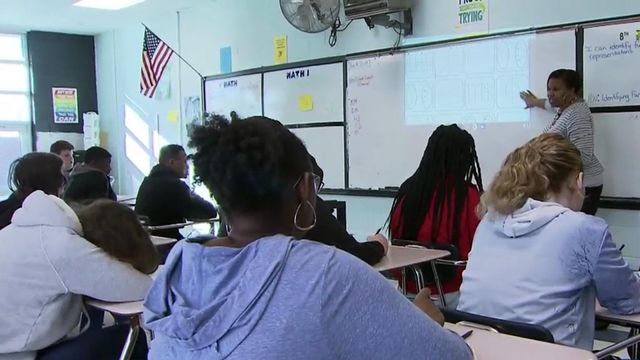Senate budget limits NC teacher, worker raises in favor of tax cuts
State Senate leaders rolled out a $25.7 billion spending proposal Monday. With a growing budget surplus, they're proposing even deeper tax cuts, but teachers and state employees would see only a 1.5% raise for each of the next two years.
Posted — UpdatedThat means the package gets much pricier, costing state coffers a total of $2.5 billion in the next two years. Senate leaders say it will lower the median household's state tax bill by 37 percent. However, the actual bill won't be available till later Monday, so WRAL News hasn't been able to double-check that.
"This budget does reflect our commitment to tax relief to our citizens when government continues to have excess revenue," Senate President Pro Tem Phil Berger said at a news conference. "The budget can be summed up in two ways: Cutting taxes and constructing North Carolina's post-pandemic future."
Teachers and state employees would see only a 1.5 percent raise for each of the next two years under the Senate proposal. The lone exception is correctional officers, who would receive an average 7 percent raise as part of introducing an experienced-based salary schedule for those workers.
Retired state workers would get no cost-of-living adjustment to their pensions.
"Quite frankly, over the past two years, we made several attempts to provide larger raises," Berger said. "The Democrats voted against those raises when the governor vetoed those [budgets]."
As for retirees, Berger said they are better served by keeping the state pension system solvent than by providing annual COLAs to their monthly pension checks.
"Our commitment is to ensure that the year-over-year spend is kept under control," he said, citing the budget cuts lawmakers had to enact a decade ago following years of spending increases that were halted by the recession.
Tamika Walker Kelly, president of the North Carolina Association of Educators, called the proposed raises for teachers "pitiful."
“This proposed budget shows that corporate tax cuts take priority over North Carolina students yet again," Kelly said in a statement.
The State Employees Association of North Carolina was similarly critical of the spending plan.
"There is no excuse to be stingy this year. SEANC is totally perplexed why the Senate proposed insignificant raises and shutting out retirees when the state is drowning in money. If ever there was a time to give significant raises, this is the year," Ardis Watkins, executive director of SEANC, said in a statement.
Senate leaders pointed out Monday that they're also giving teachers and employees bonuses.
Teachers and state employees who make less than $75,000 a year would receive a $1,500 bonus from federal pandemic relief funds. Those who make more than $75,000 would receive $1,000.
Teachers would get an additional $300 bonus from state school performance bonus money that wasn't handed out last year. It's usually based on test scores, but last year's testing data was incomplete due to pandemic-related disruptions.
Non-certified school employees, like cafeteria workers and bus drivers, would also get a raise. The Senate budget would boost the minimum wage to $13 per hour; currently, Senate leaders said, the average wage is $10.50 to $11 per hour.
"Anyone in education who says there's not enough money is certainly not reflecting the influx of dollars that have come to [school districts] directly from the federal government," Berger added, noting that districts have received $5 billion in pandemic aid.
SEANC complimented the proposal for its "equitable treatment of state employees and teachers and a higher minimum wage for school employees."
The proposal also includes big investments in capital and infrastructure needs, with $12 billion promised to those projects over the next decade. The budget proposes to spent $3 billion of that over the next two years, including $1billion for road repaving and $727 million for broadband expansion.
Monday's announcement is one step in a lengthy budget process that will likely stretch on for weeks or months.
The bill will go through Senate committees Tuesday and Wednesday, with floor votes following Thursday and Friday. It then moves to the House, where it's likely to undergo major changes.
Once the two chambers reach a compromise, the budget would then go to Cooper, who could choose to veto it, as he has done in each of the past two years.
"Real budget negotiations will be critical," he said in a statement. "In order to have a shared recovery, we must invest in education, health care, child care and tax cuts for those who need it, not tax breaks for corporations and people making more than $200,000 per year."
Democratic leaders in the General Assembly also panned the Senate plan.
"This pandemic has highlighted existing inequities, and now we have a once-in-a-lifetime opportunity to repair these faults while investing in the future of our state," Senate Minority Leader Dan Blue said in a statement. "We should pass a budget ensuring our students have access to high-quality education, expanding access to health care so that it is a right for all and not a privilege for a wealthy few and creating jobs that propel North Carolina to the forefront of innovation and economic success."
“The current budget proposal falls incredibly short of what North Carolina needs at this critical moment. We should be supporting our state’s small businesses, strengthening our schools and securing access to health care. Not doing this right now is merely kicking the can down the road and ensuring economic emergencies in the future," Houe Minority Leader Robert Reives said in a statement.
• Credits
Copyright 2024 by Capitol Broadcasting Company. All rights reserved. This material may not be published, broadcast, rewritten or redistributed.






